五年级下册英语知识点答案
- 格式:docx
- 大小:71.60 KB
- 文档页数:35
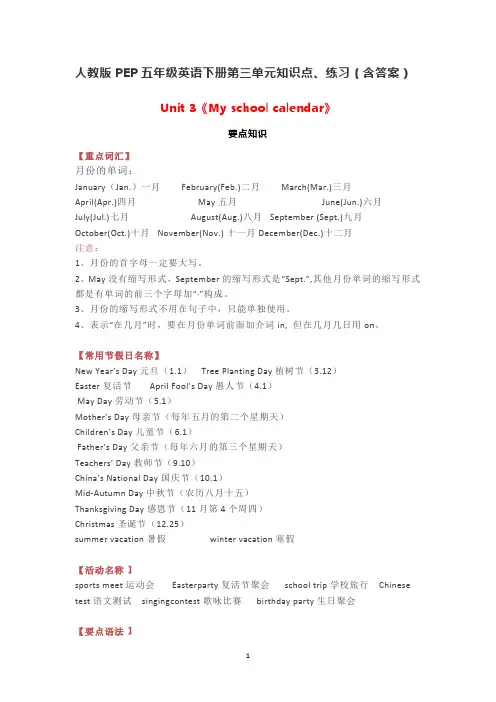
人教版PEP五年级英语下册第三单元知识点、练习(含答案)Unit 3《My school calendar》要点知识【重点词汇】月份的单词:January(Jan.)一月February(Feb.)二月March(Mar.)三月April(Apr.)四月 May五月June(Jun.)六月July(Jul.)七月August(Aug.)八月 September (Sept.)九月October(Oct.)十月 November(Nov.) 十一月 December(Dec.)十二月注意:1、月份的首字母一定要大写。
2、May没有缩写形式,September的缩写形式是“Sept.”,其他月份单词的缩写形式都是有单词的前三个字母加“·”构成。
3、月份的缩写形式不用在句子中,只能单独使用。
4、表示“在几月”时,要在月份单词前面加介词in, 但在几月几日用on。
【常用节假日名称】New Year’s Day元旦(1.1) Tree Planting Day 植树节(3.12)Easter 复活节April Fool’s Day愚人节(4.1)May Day 劳动节(5.1)Mother’s Day母亲节(每年五月的第二个星期天)Children’s Day儿童节(6.1)Father’s Day父亲节(每年六月的第三个星期天)Teachers’ Day教师节(9.10)China’s National Day国庆节(10.1)Mid-Autumn Day 中秋节(农历八月十五)Thanksgiving Day 感恩节(11月第4个周四)Christmas圣诞节(12.25)summer vacation暑假winter vacation寒假【活动名称】sports meet 运动会 Easterparty 复活节聚会 school trip 学校旅行 Chinese test 语文测试 singingcontest歌咏比赛 birthday party生日聚会【要点语法】1. 介词in 、on、at的用法。
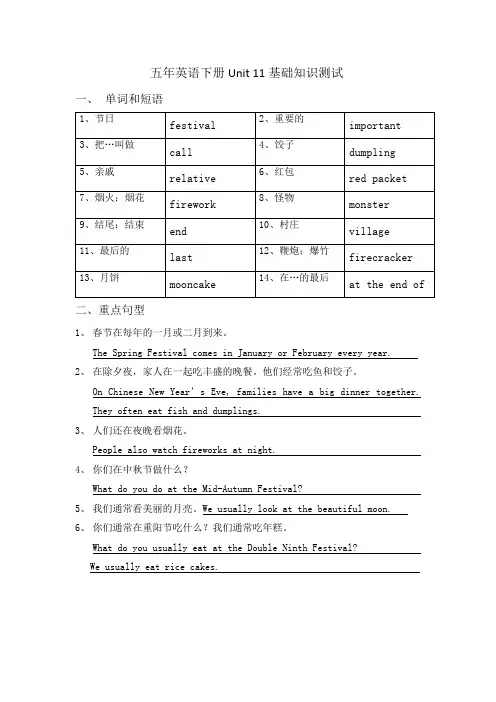
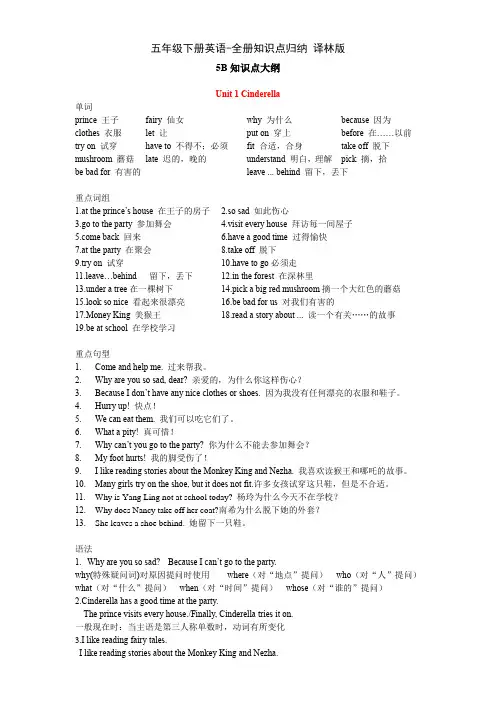
五年级下册英语-全册知识点归纳译林版5B知识点大纲Unit 1 Cinderella单词prince 王子fairy 仙女why 为什么because 因为clothes 衣服let 让put on 穿上before 在……以前try on 试穿have to 不得不;必须fit 合适,合身take off 脱下mushroom 蘑菇late 迟的,晚的understand 明白,理解pick 摘,拾be bad for 有害的leave ... behind 留下,丢下重点词组1.at the prince’s house 在王子的房子2.so sad 如此伤心3.go to the party 参加舞会4.visit every house 拜访每一间屋子e back 回来6.have a good time 过得愉快7.at the party 在聚会8.take off 脱下9.try on 试穿10.have to go必须走11.leave…behind留下,丢下12.in the forest 在深林里13.under a tree在一棵树下14.pick a big red mushroom摘一个大红色的蘑菇15.look so nice 看起来很漂亮16.be bad for us 对我们有害的17.Money King 美猴王18.read a story about ... 读一个有关……的故事19.be at school 在学校学习重点句型e and help me. 过来帮我。
2.Why are you so sad, dear? 亲爱的,为什么你这样伤心?3.Because I don’t have any nice clothes or shoes. 因为我没有任何漂亮的衣服和鞋子。
4.Hurry up! 快点!5.We can eat them. 我们可以吃它们了。
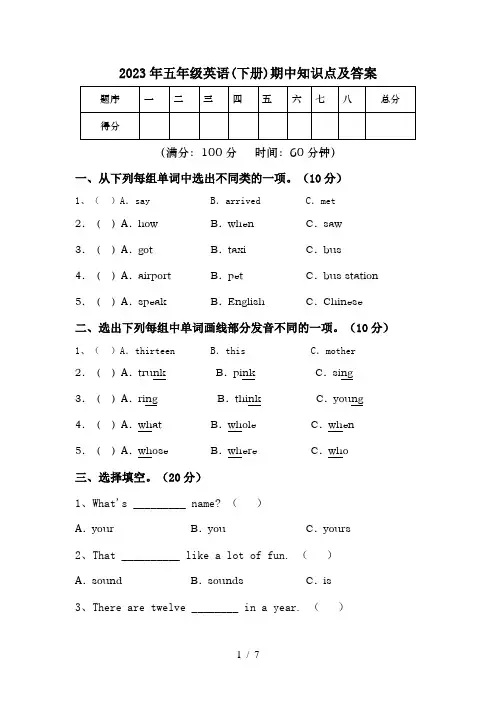
2023年五年级英语(下册)期中知识点及答案(满分:100分时间:60分钟)一、从下列每组单词中选出不同类的一项。
(10分)1、()A.say B.arrived C.met2.()A.how B.when C.saw3.()A.got B.taxi C.bus4.()A.airport B.pet C.bus station 5.()A.speak B.English C.Chinese二、选出下列每组中单词画线部分发音不同的一项。
(10分)1、()A.thirteen B.this C.mother 2.()A.trunk B.pink C.sing 3.()A.ring B.think C.young 4.()A.what B.whole C.when 5.()A.whose B.where C.who三、选择填空。
(20分)1、What's _________ name? ()A.your B.you C.yours2、That __________ like a lot of fun. ()A.sound B.sounds C.is3、There are twelve ________ in a year. ()A.months B.weeks C.days4、Mike is ________ boy in his class. ()A.taller B.the tall C.the tallest5、International Children's Day is onthe of June. ()A.first B.fourth C.fifth6、_____ book is in the classroom. _____ is here. ()A.Mine;Your B.My;Your C.My;Yours7、Many girls ____on the shoe, and it only_____ Cinderella. ()A.try, fit B.tries, fits C.try, fits8、—________ do you do on Sundays? ( )—I watch TV.A.Where B.How C.What9、Look ________the blackboard. ()A.in B.on C.at10、Nice ______ meet you. ()A.to B.too C.two四、用括号内动词的适当形式填空.(10分)1.He often ________ (have) dinner at home.2.Nick ________ (go) to the zoo last Sunday.3.She and I ________ (take) a walk together every evening.4.We ________ (watch) TV on Saturday nights.5.What ________ they ________ (do) yesterday?五、按要求完成下列各题。
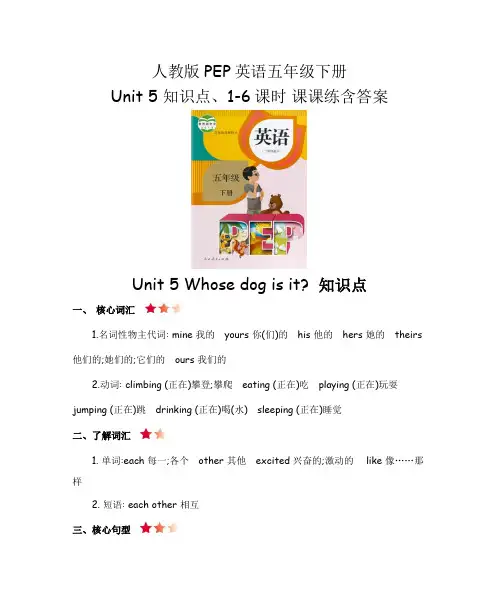
人教版PEP英语五年级下册Unit 5 知识点、1-6课时课课练含答案Unit 5 Whose dog is it? 知识点一、核心词汇1.名词性物主代词: mine 我的yours 你(们)的his 他的hers 她的theirs 他们的;她们的;它们的ours 我们的2.动词: climbing (正在)攀登;攀爬eating (正在)吃playing (正在)玩耍jumping (正在)跳drinking (正在)喝(水)sleeping (正在)睡觉二、了解词汇1. 单词:each 每一;各个other 其他excited 兴奋的;激动的like 像……那样2. 短语: each other 相互三、核心句型1.The yellow picture is mine. 那幅黄颜色的画是我的。
解读:这是表达某物是某人的句型。
举一反三: This bag is hers. 这个包是她的。
2.Are these all ours? 这些都是我们的画吗? 解读:这是询问某物是不是某人的一般疑问句。
举一反三: — Is the pencil yours? 这是你的铅笔吗?— Yes, it is. 是的。
3.— Whose is it? 它是谁的? — It ’s Zhang Peng ’s. 是张鹏的。
解读:当表示物品的从属关系时用名词性物主代词或名词所有格来表示。
人称代词表名称主格 宾格 形容词性 物主代词 名词性 物主代词I(我) me(我) my(我的) mine(我的) you(你;你们) you(你;你们) your(你的;你们的) yours(你的;你们的)he(他) him(他) his(他的) his(他的) she(她)her(她) her(她的) hers(她的) it(它) it(它) its(它的) its(它的) we(我们) us(我们) our(我们的) ours(我们的) they [他(她;它)们]them [他(她;它)们]their [他(她;它)们的]theirs [他(她;它)们的]4.— Is he drinking water? 他在喝水吗?— No, he isn’t. He’s eating. 不,不是。
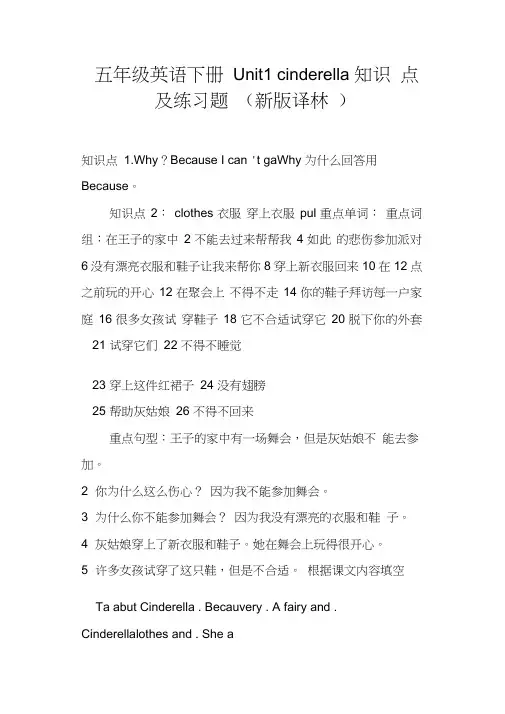
五年级英语下册Unit1 cinderella 知识点及练习题(新版译林)知识点1.Why?Because I can 't gaWhy 为什么回答用Because。
知识点2:clothes 衣服穿上衣服pul 重点单词:重点词组:在王子的家中2 不能去过来帮帮我4 如此的悲伤参加派对6 没有漂亮衣服和鞋子让我来帮你8 穿上新衣服回来10 在12 点之前玩的开心12 在聚会上不得不走14 你的鞋子拜访每一户家庭16 很多女孩试穿鞋子18 它不合适试穿它20 脱下你的外套21 试穿它们22 不得不睡觉23 穿上这件红裙子24 没有翅膀25 帮助灰姑娘26 不得不回来重点句型:王子的家中有一场舞会,但是灰姑娘不能去参加。
2 你为什么这么伤心?因为我不能参加舞会。
3 为什么你不能参加舞会?因为我没有漂亮的衣服和鞋子。
4 灰姑娘穿上了新衣服和鞋子。
她在舞会上玩得很开心。
5 许多女孩试穿了这只鞋,但是不合适。
根据课文内容填空Ta abut Cinderella . Becauvery . A fairy and . Cinderellalothes and . She aat the party. But she go o 'cluns fast andloses( 丢) her . Tany girlbut it . Finally, Cinderella 知识点1:can 的用法1) can 表示能力,意思是“能,会”。
后面直接跟动词原形,用于一切人称和数。
Can 的否定形式为can not ,其缩写为“ can't 。
如:We can speak much English now. 我们现在能说英语了。
2) 表示许可,意思是“可以”。
如:You can watch TV after supper. 晚饭后你可以看电视。
如:You can staax weeks. 你可以再待在这儿六个月。
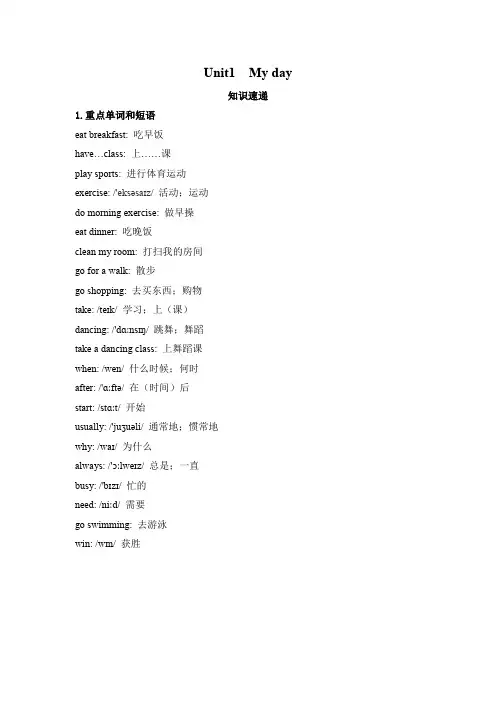
Unit1 My day知识速递1.重点单词和短语eat breakfast: 吃早饭have…class: 上……课play sports: 进行体育运动exercise: /'eksəsaɪz/ 活动;运动do morning exercise: 做早操eat dinner: 吃晚饭clean my room: 打扫我的房间go for a walk: 散步go shopping: 去买东西;购物take: /teɪk/ 学习;上(课)dancing: /'dɑːnsɪŋ/ 跳舞;舞蹈take a dancing class: 上舞蹈课when: /wen/ 什么时候;何时after: /'ɑːftə/ 在(时间)后start: /stɑːt/ 开始usually: /'juʒuəli/ 通常地;惯常地why: /waɪ/ 为什么always: /'ɔːlweɪz/ 总是;一直busy: /'bɪzɪ/ 忙的need: /niːd/ 需要go swimming: 去游泳win: /wɪn/ 获胜2.语法回顾a. 重点单词:eat breakfast, have…class, play sports, exercise, do morning exercise, eat dinner, clean my room, go for a walk, go shopping, take a dancing class, when, usually, why, always, go swimming, win, need.b. 询问何时做某事:When do you……?例:①When do you get up? (你什么时候起床?)②When do you do morning exercises? (你们什么时候做早操?)③When do they go to school? (他们什么时候去上学?)拓展:When does she eat breakfast?练一练:( ) —When______ you do morning exercises?A. doesB. doC. are( ) —When______ she go to bed?A. doesB. doC. arec. 询问他人周末做什么:What do you do on the weekend?例:①What do you do on the weekend? (你周末做什么?)②What does she do on the weekend? (她周末做什么?)回答:①I usually clean my room. (我通常打扫房间。
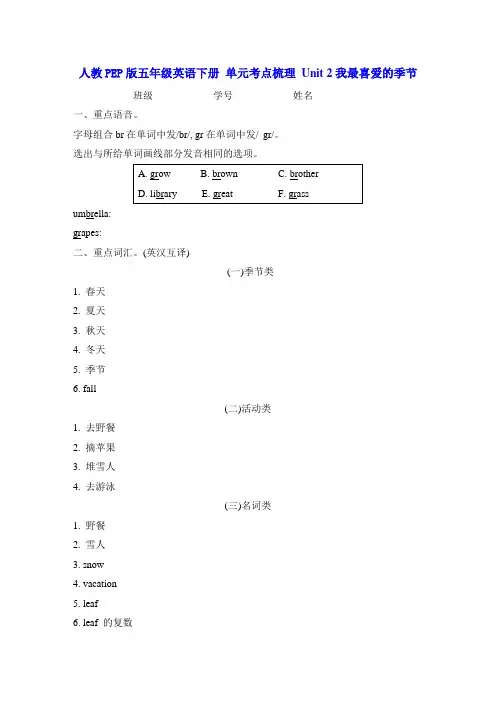
人教PEP版五年级英语下册单元考点梳理Unit 2我最喜爱的季节班级__________ 学号__________ 姓名__________一、重点语音。
字母组合br在单词中发/br/, gr在单词中发/gr/。
选出与所给单词画线部分发音相同的选项。
umbrella: _________________________________________________grapes: ________________________________________________二、重点词汇。
(英汉互译)(一)季节类1. 春天________________________________________________2. 夏天________________________________________________3. 秋天________________________________________________4. 冬天________________________________________________5. 季节________________________________________________6. fall________________________________________________(二)活动类1. 去野餐________________________________________________2. 摘苹果________________________________________________3. 堆雪人________________________________________________4. 去游泳________________________________________________(三)名词类1. 野餐________________________________________________2. 雪人________________________________________________3. snow________________________________________________4. vacation________________________________________________5. leaf________________________________________________6. leaf 的复数________________________________________________(四)动词类1. 摘; 采集________________________________________________2. paint________________________________________________(五)其他类1. which________________________________________________2. best________________________________________________3. because________________________________________________4. all________________________________________________5. pink________________________________________________6. lovely________________________________________________7. good job________________________________________________三、重点句子。
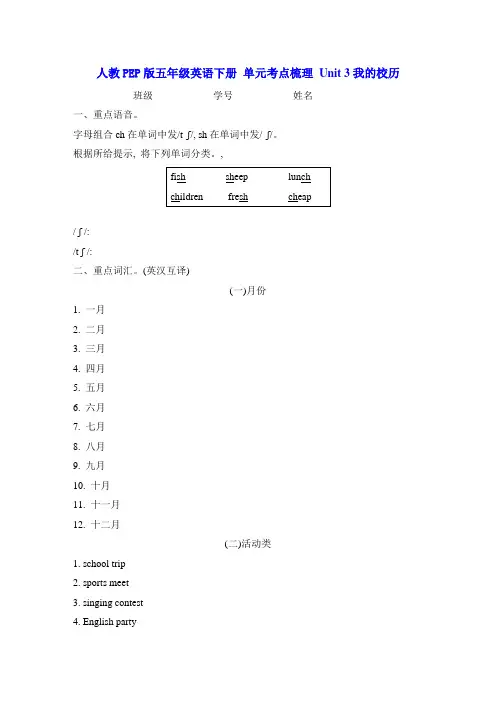
人教PEP版五年级英语下册单元考点梳理Unit 3我的校历班级__________ 学号__________ 姓名__________一、重点语音。
字母组合ch在单词中发/tʃ/, sh在单词中发/ʃ/。
根据所给提示, 将下列单词分类。
,/ ʃ /: ________________________________________/t ʃ /: ________________________________________二、重点词汇。
(英汉互译)(一)月份1. 一月________________________________________2. 二月________________________________________3. 三月________________________________________4. 四月________________________________________5. 五月________________________________________6. 六月________________________________________7. 七月________________________________________8. 八月________________________________________9. 九月________________________________________10. 十月________________________________________11. 十一月________________________________________12. 十二月________________________________________(二)活动类1. school trip________________________________________2. sports meet________________________________________3. singing contest________________________________________4. English party________________________________________(三)节日类1. China's National Day________________________________________2. American Thanksgiving Day________________________________________3. Christmas_________________________________________(四)其他类1. few________________________________________2. thing________________________________________3. meet________________________________________4. trip________________________________________5. year________________________________________6. plant________________________________________7. contest________________________________________8. national________________________________________9. American________________________________________10. game________________________________________11. riddle________________________________________12. act________________________________________13. RSVP________________________________________14. by________________________________________15. a few________________________________________16. the Great Wall________________________________________17. act out________________________________________三、重点句子。
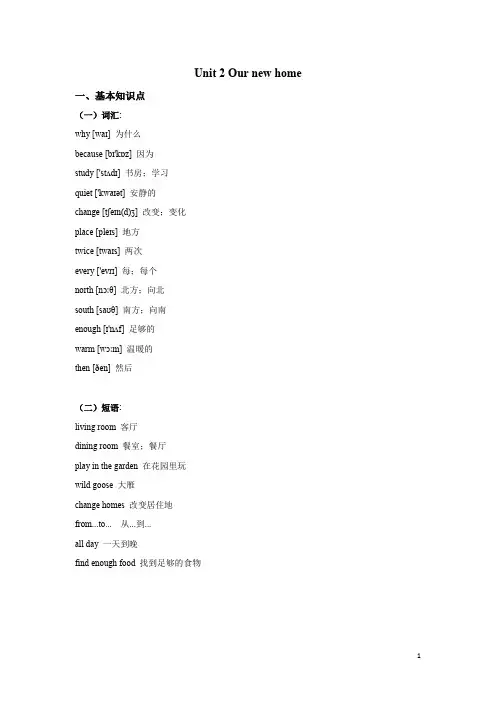
Unit 2 Our new home 一、基本知识点(一)词汇:why [waɪ] 为什么because [bɪ'kɒz] 因为study ['stʌdɪ] 书房;学习quiet ['kwaɪət] 安静的change [tʃeɪn(d)ʒ] 改变;变化place [pleɪs] 地方twice [twaɪs] 两次every ['evrɪ] 每;每个north [nɔːθ] 北方;向北south [saʊθ] 南方;向南enough [ɪ'nʌf] 足够的warm [wɔːm] 温暖的then [ðen] 然后(二)短语:living room 客厅dining room 餐室;餐厅play in the garden 在花园里玩wild goose 大雁change homes 改变居住地from...to... 从...到...all day 一天到晚find enough food 找到足够的食物(三)句型:1.—Why do you like it?—Because it’s so big/quiet.2.—Do you like our new home?—Yes, I do./Yes, It’s nice. I like the living room.3.There is/are... in/near my home.(四)重难点、易错点:1.Why 作为疑问词,表示“为什么”,回答原因时要用because, 注意在句首时大写。
2.in作为时间介词,后面加年份(in 2018)/月份(in March)/季节(in spring)/早晨、下午、晚上。
3.There is/are表示“某地有某物”,单复数形式与其后的名词保持一致。
4.字母组合发音规律:ir skirt girlur purse burnau Laura daughteroor floor poor二、典型例题1. It’s hot ________ summer. I want to stay ________ home.A.in inB. in atC. at in【解析】答案:B固定搭配in+季节、月,待在家stay at home。
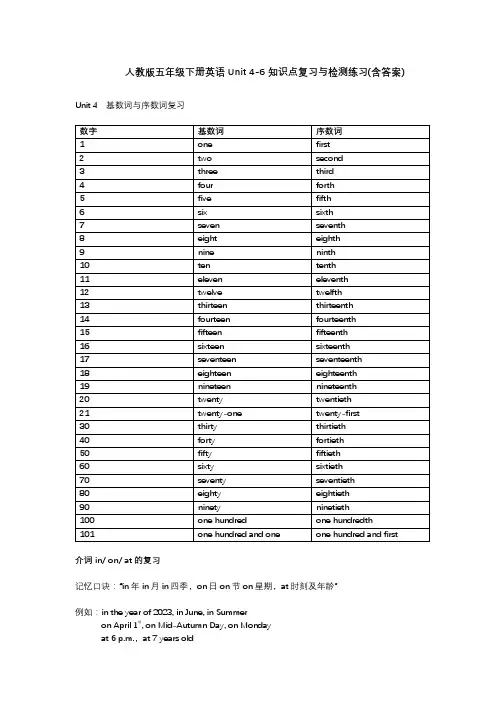
人教版五年级下册英语Unit 4-6知识点复习与检测练习(含答案) Unit 4 基数词与序数词复习介词in/ on/ at的复习记忆口诀:“in年in月in四季,on日on节on星期,at时刻及年龄”例如:in the year of 2023, in June, in Summeron April 1st, on Mid-Autumn Day, on Mondayat 6 p.m.,at 7 years oldUnit 4单元练习 (含答案)一、在表格中填入相应的英文数词。
(9分,9%)one two three five twelve twenty forty first二、在表格中填入相应的英语单词。
(21分,21%)一月 二月 四月 八月 九月 十月 十一月星期日 星期一 星期二 星期三 星期四 星期五 星期六三、在下方划线处填入适当的词。
(10分,10%)1. There are ________seasons ________ a year.2. Tuesday is the ________ day in a week.3. May Day is ________ May 1st.4. Andy’s birthday is __________ June 14th. 5. --________ is China’s National Day?--It’s _______ October 1st.6. I usually sleep ______ 10 p.m.7. He gets up _______six thirty every morning.8. _______ the age of seven, I began to study at this school.四、看图完成句子,一空一词。
(16分,16%)15Day 21 Summer Winter Autumn三月 AugustEnglish test Tony’s Birthday1 2 3 4 51. We will have ________ English test ________ ________ ________.2.T ony’s Birthday is _________ __________ __________.3.It’s hot ________ summer. We can ________ in the swimming pool.4.We can _________ _________ ___________ ___________ winter.5.We will go to the ___________ ___________ ___________ autumn.五、根据汉语提示,翻译下列句子。
人教版PEP五年级英语下册第三单元知识点、练习(含答案)人教版PEP五年级英语下册第三单元知识点、练(含答案)Unit 3《My school calendar》要点知识【重点词汇】月份的单词:January(XXX.)一月February(Feb.)二月March(Mar.)三月April(Apr.)四月May五月June(Jun.)六月July(Jul.)七月August(Aug.)八月September (Sept.)九月October(Oct.)十月November(Nov.)十一月December(Dec.)十二月注意:1、月份的首字母一定要大写。
2、May没有缩写形式,September的缩写形式是“Sept.”,其他月份单词的缩写形式都是有单词的前三个字母加“·”构成。
3、月份的缩写形式不用在句子中,只能单独使用。
4、表示“在几月”时,要在月份单词前面加介词in,但在几月几日用on。
【常用节假日名称】New Year’s Day元旦(1.1)Tree Planting Day植树节(3.12)Easter复活节April Fool’s Day愚人节(4.1)May Day 劳动节(5.1)XXX母亲节(每年五月的第二个星期天)Children’s Day 儿童节(6.1)Father’s Day父亲节(每年六月的第三个星期天)Teachers’ Day教师节(9.10)China’s National Day国庆节(10.1)Mid-Autumn Day中秋节(阴历八月十五)Thanksgiving Day感恩节(11月第4个周四)Christmas圣诞节(12.25)summer vacation暑假winter vacation暑假【举动称号】sports XXX举动会Easterparty复生节集会school trip黉舍游览Chinesetest语文测试singingcontest歌颂竞赛birthday party华诞集会【要点语法】11.介词in、on、at的用法。
人教版五年级下册英语第二单元知识点Unit Two My favourite season 一、词汇spring春天summer夏天autumn秋天winter冬天season季节go on a picnic去野餐pick apples摘苹果play in the snow在雪里玩plant flowers种花eat ice cream吃冰激凌make a snowman堆雪人go swimming去游泳good job做得好which哪一个leaf叶子(复数:leaves)because=because of因为in spring/summer/autumn/winter在春天/在夏天/在冬天/在冬天Children’s Day儿童节in the snow在雪里in the sea在海里fly kites放风筝sleep all day整天睡觉go to school去学校go home回家Merry Christmas圣诞快乐Summer vacation暑假Look at 看I like to swim=I like swimming.二、语法(一)Which引导的特殊疑问句,就最喜欢的季节是哪一个进行提问Which season do you like best?回答:I like+季节+best.或者I like+季节.或者直接说季节名称。
拓展:What is your favourite season?回答: My favourite season is+季节.季节+is my favourite season.(二)What引导的特殊疑问句,就天气进行提问What is the weather like today?回答:It is......(三)What引导的特殊疑问句,就在某一个季节做某事进行提问What do you often do in +季节?回答:I often+具体的事情.三、重要句子Which season do you like best?I like spring best.Why do you like autumn best?Because the colours are pretty.There are beautiful flowers everywhere.I can sleep all day.How about you?=What bout you?I like summer best.because of Children’s Day.Look at my picture.The weather is good and the colours are beautiful.There is lots of snow.I want to paint a picture ,too.What is your favourite season?My favourite season is spring四、语音(辅音字母组合发音)①br发音为/br/br own li br ary br other um br ella br eakfast②gr发音为/gr/gr een gr apes gr andpa gr ow gr ass gr eat五、拓展①Why和because的用法Why 引导询问原因的特殊疑问句。
Unit 2 My favourite season知识速递1.重点单词和短语spring: /sprɪŋ/ 春天summer: /'sʌmə/ 夏天autumn: /'ɔːtəm/ 秋天winter: /'wɪntə/ 冬天season: /'siːzn/ 季节picnic: /'pɪknɪk/ 野餐go on a picnic: 去野餐pick: /pɪk/ 摘;采集pick apples: 摘苹果snowman: / 'snəʊmæn/ 雪人make a snowman: 堆雪人go swimming: 去游泳which: /wɪtʃ/ 哪一个best: /best/ 最;最高程度地good job: 做得好because: /bɪ'kɒz/ 因为vacation: / vəˈkeɪʃn/ 假期fall: /fɔːl / 秋天leaf: /liːf / 叶子lovely: / 'lʌvli / 可爱的;美丽的2.语法回顾a.重点单词:spring, summer, autumn, winter, season, go on a picnic, pick apples, make a snowman, go swimming, which, best, because, vacation.b. 询问最喜爱的季节:Which season do you like best?例:① Which season do you like best? (你最喜欢哪个季节?)② Which season does she like best? (她最喜欢哪个季节?)③ Which season do they like best? (他们最喜欢哪个季节?)拓展:Which season do you like best?=What’s your favourite season?练一练:( ) _______ season do you like best?A. WhatB. WhenC. Which回答:①I like spring best. (我最喜欢春天。
译林版五年级英语下册知识点梳理汇总Unit85B Unit8Birthdays⼀、词汇A.单词Birthday⽣⽇eleventh第⼗⼀together⼀起August⼋⽉eighth第⼋December⼗⼆⽉April四⽉hero英雄go shopping去购物play戏,喜剧March三⽉number数字July七⽉password密码B.词组1.on the eleventh of May在5⽉11⽇2.Su Yang’s birthday苏阳的⽣⽇3.on her birthday在她的⽣⽇那天4.eat(some)noodles吃⾯条12answer答案fourth第四start开始fight打仗,⼤家5.have a big dinner with our parents and grandparents和我们的⽗母和祖⽗母吃⼤餐6.a birthday cake⼀块⽣⽇蛋糕7.have a party开派对8.play(some)games玩游戏9.play with Kitty the cat和凯蒂这只猫玩10.have a great time玩的愉快11.a lot of fun许多乐趣12.in a p lay在⼀场戏剧中13.be good at Maths擅长数学14.the fourth number第四个数字15.start fighting开始打架/doc/91e0c5497b563c1ec5da50e2524de518964bd3cf.html e out from a room从⼀个房间出来17.run away逃跑18.What a play!怎样的⼀场戏剧呀!⼆、语⾳:th[e]brother,father,mother,these,they,their,there,them,these,those…三、⽇常交际⽤语及句型1.when is your birthday?It’s on the eighth of April.你的⽣⽇是什么时候?在四⽉⼋号。
广州教科版五年级下册英语目标句型1. 下周我们要去海南玩五天。
______________________________________________ 2.我们可以购物、在游泳池游泳或在沙滩上玩。
_____________________________________________________ 3. 我很想快点看到所有可爱的小鹿。
______________________________________________ 4. 我相信我们会在海南玩的愉快。
______________________________________________Next week we willin Hainan for five days.We will fly thereearly in the morning on Tuesday,November 23rd.In the afternoon,we will go for a_______.On the 24th we will go _________climbing all day.November 25th is a free day.We can go shopping,swim in the pool or play on the_________.On the 26th we are going to visit a farm.I can't ______to see all the lovely_______.That evening we will camp under the stars.Then we will fly back home at noon the next day.I'm sure we'll have a good time in Hainan.目标语言点1.on Tuesday,November 23rd具体日期前的介词为on,月份前的介词为in,具体时间前的介词为at.例:Children’s day is in June.Children’s day is on June 1.I always get up at six o’cl ock in the morning.2.deer的用法deer是单复数同形的名词其他单复数同形的名词还有fish,sheep等例: There is a deer on the farm.There are five deer on the farm.3.will+动词原形“wi ll+动词原形”是表达一般将来时的句型之一,表示将来某个时间会发生的动作。
Unit 1 This Is My Day A Part1答案:知识点:1.翻译短语1.1 do morning exercises 1.2 have English class1.3 play sports/do sports 1.4 eat breakfast/have breakfast1.5 eat dinner/have dinner☆2. 2.1 have P.E. class/have music class/have science class/have art class2.2 have/eat lunch2.3 Good morning !☆3. English 是专有名词。
第一个字母永远大写。
English 的中文是“英语,英国人,英国(人)的,英语的”。
English 后面接可数名词的单数形式,表达一个时前面必须用an。
如:an English bookexercise 的中文“练习,运动,操练,活动”。
复数是 exercises。
exercise和English 一样当其后面接可数名词单数形式,表达一个时前面必须用 an。
如: an exercise book4.点钟前面用介词at。
如: at 8:005.When do you do morning exercises?的中文是“你什么时候做早操?”答语是:I do morning exercises at 8:00.when是对at 8:00提问的。
when是疑问副词,是对时间进行提问的。
检测题:一.英汉互译。
1.1 do morning exercises 1.2 上音乐课1.3 play sports/do sports 1.4 吃午饭1.5 eat breakfast 1.6上科学课1.7 eat dinner 1.8 上体育课1.9 have English class 1.10上美术课1.11 Good morning!二.选词填空。
2.1 an 2.2 at三.英译汉。
你什么时候进行体育活动?我通常3:30进行体育活动。
Unit1 This Is My Day A Part 2答案:知识点:1.回答“When do you get up?”这类句子有两种方法可说I get up at 6:00.或At 6:00.”划线部分可以替换。
2.What about you?的同义句是How about you?和 And you?3.翻译句子: 3.1 那个是迈克的时间表。
3.2 告诉我们关于你的一天。
4.翻译短语:4.1 get up 4.2 go to school 4.3 go to bed检测题:一.连词成句。
1.1 When do you eat breakfast?1.2 I usually get up at 6:30.1.3 Tell us about your day.二.选择填空。
2.1 at 2.2 up 2.3 to 2.4 Amy’s 2.5 usUnit1 This Is My Day A Part 3答案:知识点:1.翻译单词和句子1.1 evening 1.2 get up 1.3 at 1.4 noon1.5 When do you eat dinner?1.6 I eat dinner at 7:00 in the evening.1.7 When do you get up?1.8 I usually get up at 12:00 noon.2.excuse: 动词的意思是原谅,名词的意思是借口。
Excuse me. 译为:对不起,打扰一下。
3.当征求对方意见语气比较客气、委婉,并确定对方能用肯定语气回答的,一般问句中可以用“some”.4.What do you do ? 在对话中的意思是:“你是干什么的?”同义句是What are you ?5.翻译短语:5.1 in the morning / in the afternoon / in the evening5.2 at 12:00 noon.5.3 大约在下午3点。
6.Thank you for + 动词的ing形式,表示为…事谢谢你。
如:Thank you for telling me about your day.谢谢你告诉我关于你的一天。
检测题:一.汉英互译。
1.1 in the evening 1.2 get up 1.3 at about 4:00 in the afternoon1.4 at 12:00 noon 1.5 When do you eat breakfast? 1.6 在早上1.7 我可以你一些问题吗? 1.8 谢谢的告诉了我关于关于你学校的情况。
1.9 警察 1.10 原谅二.连词成句。
2.1 I eat dinner at 7:00 in the evening.2.2 When do you get up?2.3 I usually get up at 12:00 noon.2.4 I play sports at about 3:00 in the afternoon.2.5 Thank you telling me about your day.★三.找合适的答语。
(E)3.1 (C)3.2 (A)3.3 (A)3.4 (B)3.5四.选择题。
4.1 C 4.2 C 4.3 A 4.4 C 4.5 A★五.根据课文内容回答问题。
5.1 He eats dinner at 7:00 in the evening.5.2 He usually get up at 12:00 noon.Unit 1 This Is My Day B Part 1答案:知识点:1.翻译短语:1.1 climb mountains/climb a mountain 1.2 go shopping 1.3 go hiking1.4 play the piano 1.5 visit grandparents2.翻译短语:2.1去钓鱼 2.2 去划船 2.3去游泳(在英语中,go +动词ing 的词组表示去干什么。
如:go dancing,去跳舞等)2.4每个周末3.乐器前面必须加定冠词the,如play the piano/violin而球类前则不能加任何冠词,如:play football.4.How about you?=What about you?=And you? 寻求对方意见,意思是”你怎么样?那你呢?”5.在周末、星期、和具体的日期前都用介词on.如:on the weekend在周末, on Monday 在星期一 ,on May 1st 在五月一日等。
6.What do you do on the weekend?的中文意思是”你在周末都干什么?”答语是I often watch TV. 可以根据实际情况替换划线部分的动词短语。
检测题:一.英汉互译。
1.1 climb mountains/climb a mountain 1.2 go hiking 1.3 play the piano 1.4 visit grandpatents 1.5 go shopping 1.6 去钓鱼 1.7 去划船 1.8 每天 1.9 去游泳二.改错。
2.1 I usually play ping-pong on Saturdays.2.2 What do you do on the weekend?2.3 I often play the piano on Sundays.三.按要求完成下列各题。
3.1 What about you?或And you?3.2 你在周末都做什么?我常常去购物。
Unit 1 This Is My Day B Part 2答案:知识点:1.翻译:1.1 一起 1.2.下一个2.在英语中名词所有格表示“某人的”,在名字后面加’s。
如:Zhang Peng’s张朋的书.ually,often,sometimes,这三个词叫做频度副词,usually译为“通常”、“一般”,即很少例外,often意为“经常”,不如usually那么频繁,表示动作重复,中间有间断。
Sometimes意为“有时候“,表示动作偶尔发生,间隔较大。
如下图所示:5.句子Let’s go hiking together next Sunday.意思是“下周日咱们一起去远足吧。
”Let 引导的祈使句后边要接动词原形,即Let sb(人) do(动词原形) sth(事).让某人做某事。
如:Let me help you.让我来帮助你。
Let后面要用动词原形help .检测题:一.选择。
1.1 A 1.2 B二.根据表格用usually, often, sometimes填空。
2.1 usually 2.2 sometimes 2.3 often三.选词填空。
3.1 do 3.2 sometimes四.连词成句,并翻译汉语意思。
Let’s go hiking together next Sunday.让我们下周日一起去远足吧。
Unit 1 This Is My Day B Part3答案:知识点:1.翻译单词。
1.1 weekend 1.2 often 1.3 sometimes 1.4下雨 1.5也2.翻译句子。
2.1What do you do on the weekend?2.2Usually I watch TV and go shopping. Sometimes I visit my grandparents.2.3I often play football, Sometimes I go hiking.2.4我不能在雨中踢足球。
2.5但不是这个周末。
3.含情态动词can 的句子变否定句直接在can的后面加not, can not的缩写是can’t。
如:I can’t go hiking.4.too ,either, 都有“也”的意思,放在句子末尾前面用逗号隔开。
但“too”用于肯定句中,而“either”用于否定句中。
5.fun的形容词形式是双写n 加y, funny。
come 的对应词是go。
6.The weather report says it’s going to rain tomorrow.意思是“天气预报说明天要下雨。
”句中is going to表一般将来时,结构是be(am, is, are) going to +动词原形。
检测题;一.英汉互译.1.1 often 1.2 weekend 1.3 sometimes 1.4也 1.5 下雨1.6 What do you do on the weekend? 1.7 I often play football.Sometimes I go hiking.1.8 Usually I watch TV and go shopping. Sometimes I visit my grandparents.1.9天气预报说明天将会下雨。